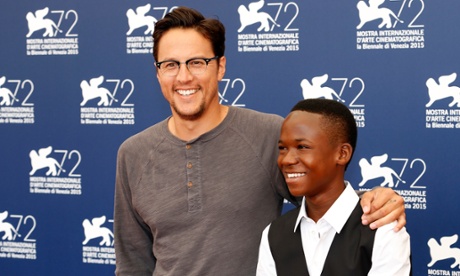
It may be billed as the film that is set to shake up the entire industry, a harbinger of a time when no one visits the cinema and downloads new films directly from the internet, but Beasts of No Nation has certainly pulled no punches in its world premiere presentation at the Venice film festival. Having been bought by Netflix in a $12m deal, Beasts of No Nation is set for only a cursory theatrical release, with its availability on video-on-demand on the same day.
However, the film, directed by Cary Fukunaga and starring Idris Elba, impressed critics at Venice, with the Guardian’s Peter Bradshaw calling the study of child soldiers in an unnamed West African war zone “a violent and disorientating nightmare with a shiver of Coppola’s Apocalypse Now”, while Variety said it possessed a “savage beauty and matter-of-fact horror”. Beasts of No Nation features a host of first-time actors, most cast from local children, including the film’s lead, 14-year-old Abraham Attah, who Fukunaga said he discovered while Attah was “playing hookey”. According to Attah himself, who joined Fukunaga in the press conference, he was playing football when “a white man came and said he wanted people for a movie”.
Fukunaga explained that more than 600 children were seen initially, with the final selection being made through a series of workshops in Ghana, where the film was shot. “We spent four weeks improvising scenes from the movie. It also gave a chance to see who had discipline and stamina, as well as acting ability.” Fukunaga also explained that some of the people cast as extras were forced to drop out as they travelled to the shoot after they were arrested on suspicion of being mercenaries.
Adapted from a novel by Uzodinma Iweala, Beasts of No Nation deals directly with the process of indoctrination and desensitisation practised by certain irregular militias. Fukunaga, who studied political science at the prestigious Institut d’Études Politiques in Grenoble, France, said: “The tactics are very common. They are all based on human psychology. We followed very closely the initiation process of a Sierra Leonean tribal army, in terms of weapons training, propaganda, and spiritual indoctrination.” Fukunaga stressed he wanted to avoid any suggestion of a religious dimension to the on-screen conflict, saying “it’s too easily pigeonholed”.
Fukunaga also said that the character of the charismatic Commandant, played by Elba, was based in part on a Haitian gang leader he had met in the notorious Cité du Soleil neighbourhood. “He was just a handsome charismatic figure who came out of the streets and had a natural magnetism, and had the ability to command a portion of his neighbourhood.”
As for being a crucible for the Netflix revolution in cinema, which has seen the film threatened with a boycott by major US cinema chains in protest at the breaking of the traditional 90-day window between theatrical release and home availability, Fukunaga was circumspect on the subject of whether his film was helping to cripple cinemas. “It’s very hard to get a film exhibited these days. It’s already very hard to find space in a theatre for a film that isn’t some giant spectacle ... Right now we find ourselves in a very interesting democratic moment of cinematic attendance, where by the simple act of showing up to a screening we are telling exhibitors and distributors we want to watch these kind of films, instead of only tentpole films.”
Beasts of No Nation is released in cinemas and on VOD on 19 October.

